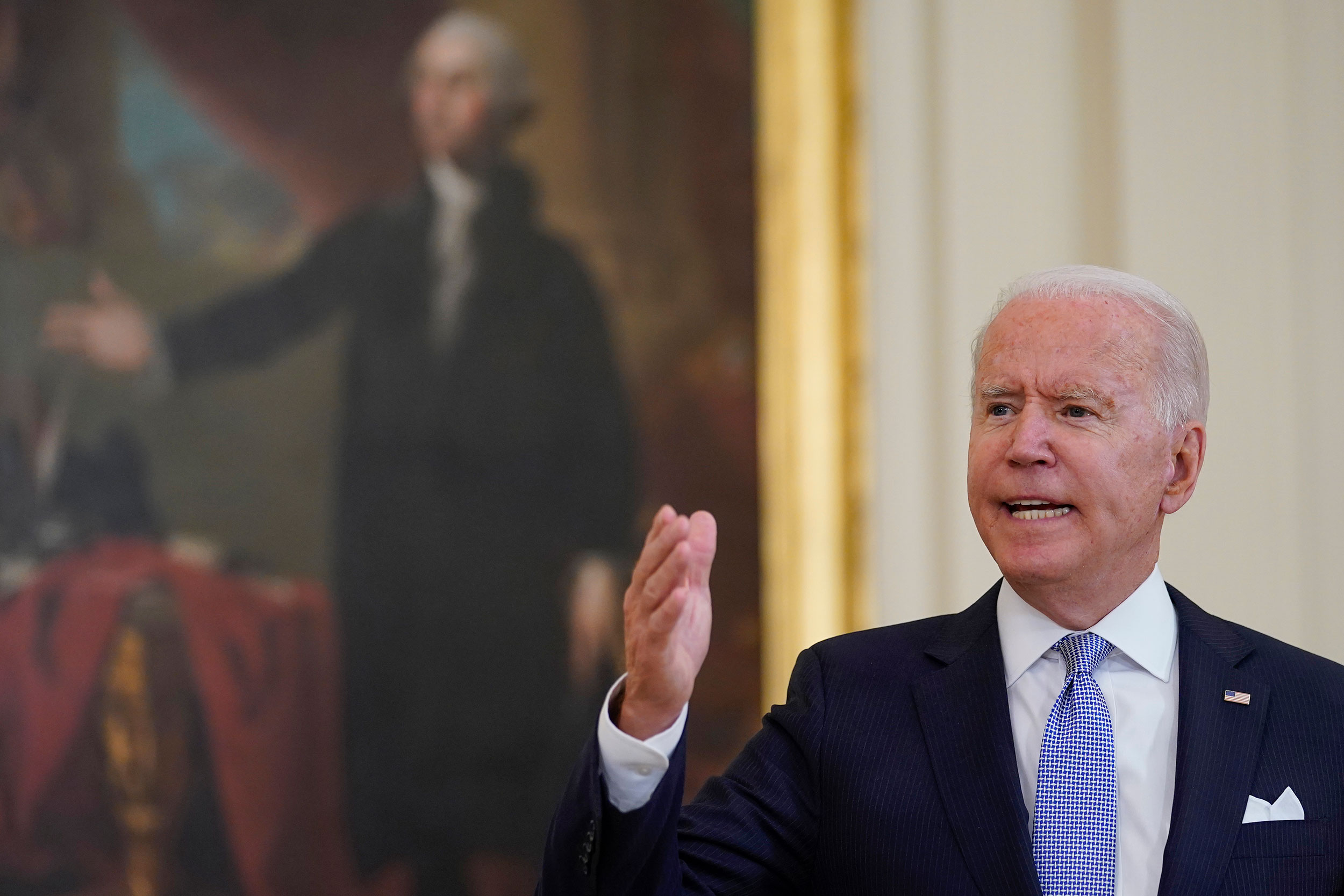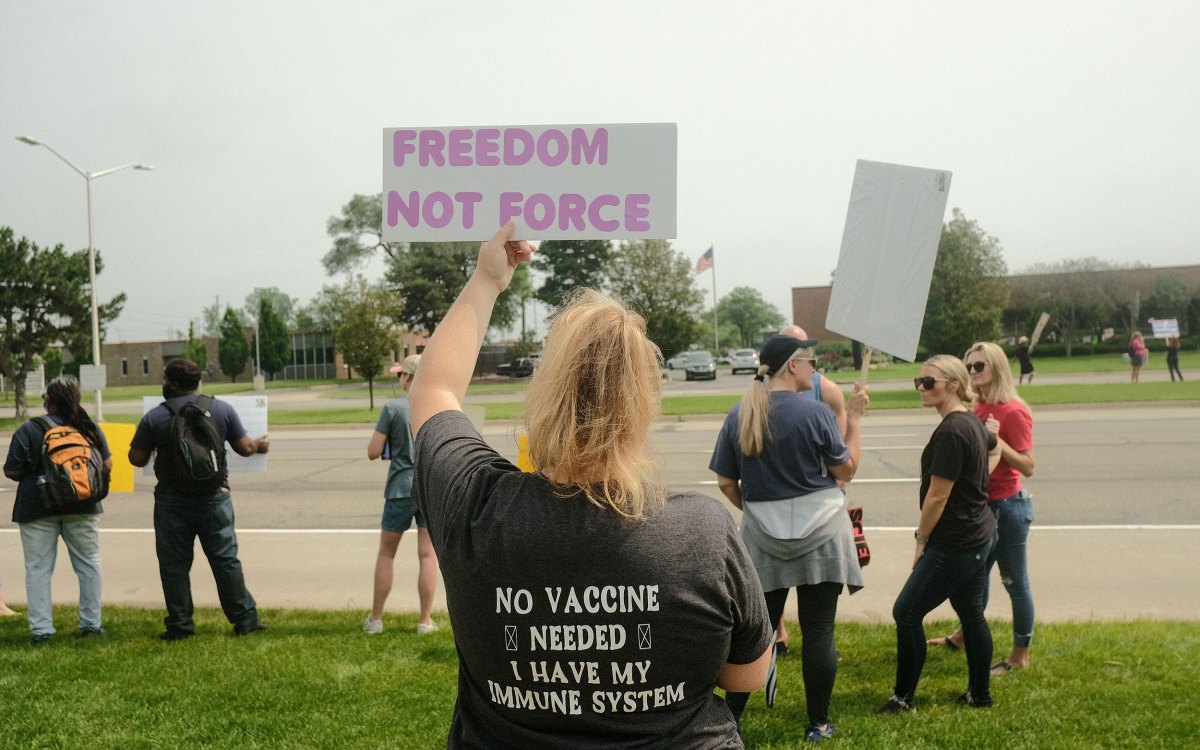
President Biden announced vaccine requirements for all federal workers on Thursday.
AP Photo/Susan Walsh
How far can Biden go?
Obama-era White House counsel looks beyond vaccination mandate to possible follow-up orders, litigation
Seeking to jumpstart COVID-19 vaccinations amid surging delta variant cases, President Biden has imposed new requirements on all federal employees, including contractors. This workforce of 4 million will have to show they are vaccinated. Those who refuse will have to undergo weekly COVID-19 testing, socially distance, and wear masks while on the job, Biden announced Thursday. Members of the military will also be required to attest to vaccination, the Defense Department announced.
Several union leaders for federal employee groups have objected to the order and predicted widespread resistance among their members. With politics fueling much of the lingering opposition to vaccines and masks, some question whether the mandate exceeds the president’s constitutional authority.
W. Neil Eggleston, a lecturer on law at Harvard Law School, served as White House counsel to President Barack Obama from 2014 to 2017, and as associate counsel to the president during the Clinton administration. He also represented the Office of the President during the independent counsel’s Whitewater and Lewinsky investigations. Eggleston spoke to the Gazette about the scope and soundness of Biden’s authority to issue a mandate, and how courts are likely to see it.
Q&A
W. Neil Eggleston
GAZETTE: Does Biden have the power as president to unilaterally mandate that government employees get vaccinations or follow a COVID protocol? Is that a settled legal matter?
EGGLESTON: I don’t think it’s particularly settled because I don’t think it’s ever happened.
If you were to ask, “Does he have the power to order everybody in the United States to be vaccinated” — there are a lot more issues there, I’m not entirely sure how that would come out. But, as to federal employees, I think the president can rationally conclude, as the head of the executive branch, that having vaccinated employees is critical to the effective working of the federal workforce and the federal government, and that having unvaccinated people [around] exposes them to the delta variant. We’ve learned that people exposed to that variant are [experiencing] infections, even people who’ve been vaccinated. So, I think a court would conclude that he has the power to order vaccinations. There are some constraints, which is that he can’t do it in violation of some other statutes. There may be aspects of the Americans with Disabilities Act and other statutes that may apply.
The other thing that the president has done is he’s providing an out: To the extent somebody does not want to get a vaccination, they’re not going to get fired as long as they mask and are tested on a weekly basis. It’ll be a hassle for them. Hopefully, it will mean that they will decide it’s easier for them to get a vaccination than to persist in their view that they don’t want to get one. But, particularly with that out, I think a court would surely conclude that there is a valid reason. This Supreme Court has been very solicitous of religious rights, particularly during COVID. I suspect there’ll be some people who will try to make a religious argument out of this. I don’t really see how that would be successful, but I suspect that we’ll see some religious challenges.
GAZETTE: Is there any precedent for a president issuing a mandate like this?
EGGLESTON: We haven’t really experienced a circumstance like this. What immediately came to mind, in terms of presidential power, is the famous steel seizure case. In the middle of the Korean War, steel workers were calling a strike. President [Harry] Truman ordered the Commerce Department to seize the mills, which were producing the steel that was being manufactured into planes and trucks and the materials of war. The Supreme Court said, “No, Mr. President, you don’t have the power to do that. That’s congressional power. It’s not presidential power.” That’s a very different circumstance than this. Because he’s at the head of the federal workforce, he’s entitled to protect the federal workforce and the operation of the federal government.
GAZETTE: Are there limits to what a president can mandate even during a crisis?
“Because [Biden is] at the head of the federal workforce, he’s entitled to protect the federal workforce and the operation of the federal government.”
EGGLESTON: Presidents have the inherent power as long as there’s a rational basis for it. I don’t think the president could say all federal employees have to wear a yellow ribbon in their hair because that would put a burden on the employees, and it would have no benefit. There would be limits on what you can compel the employees to do. The limits would be fairly broad though, as long as the president can articulate a rational reason for imposing the requirement. And I think a court would easily conclude, particularly with the impact of the delta variant, that this is a rational step to protect the federal workforce and the operation of the federal government.
GAZETTE: Although he has not indicated that he will do so, could Biden impose harsher penalties in the future, deciding that anyone who won’t comply after a certain date is fired?
EGGLESTON: Sure. In fact, it wouldn’t surprise me if they don’t resort, at some point, to an escalation because, again, I think the order is rationally based and related to a pretty important governmental interest. I think people who refuse both to get vaccinated and the alternative could be fired. Because otherwise, it’s not really much of a mandate.
GAZETTE: Will the fact that the penalty is more of a nuisance than a serious harm make court challenges more difficult?
EGGLESTON: This would be a different issue, and obviously a tougher issue, if it was a flat mandate. There would certainly be people who would have religious objections and, particularly with this Supreme Court, there’d be some receptivity to that kind of an argument. But I don’t think that the fact that there’s a relatively insignificant burden is enough to get those objectors out from under the alternative measures. I think they would be very hard-pressed. With testing as an alternative, it will be very hard for an employee to claim that this is such a big burden.
GAZETTE: Even so, do you expect a wave of litigation over this?
EGGLESTON: Because of the political world we’re in, there will definitely be litigation. And plaintiffs have some ability to, in various locations, pick the judges they want to rule on these things by filing in various places. Unfortunately, this entire issue of masks and vaccines has just become so political, and it’s really a shame. But it will mean that people with political interests will bring lawsuits in order to kind of mess with the system. So, there’ll be lawsuits, and there will probably be some judges who will uphold them. But the administration is on very solid ground and will prevail, ultimately.
Interview has been edited for clarity and length.






